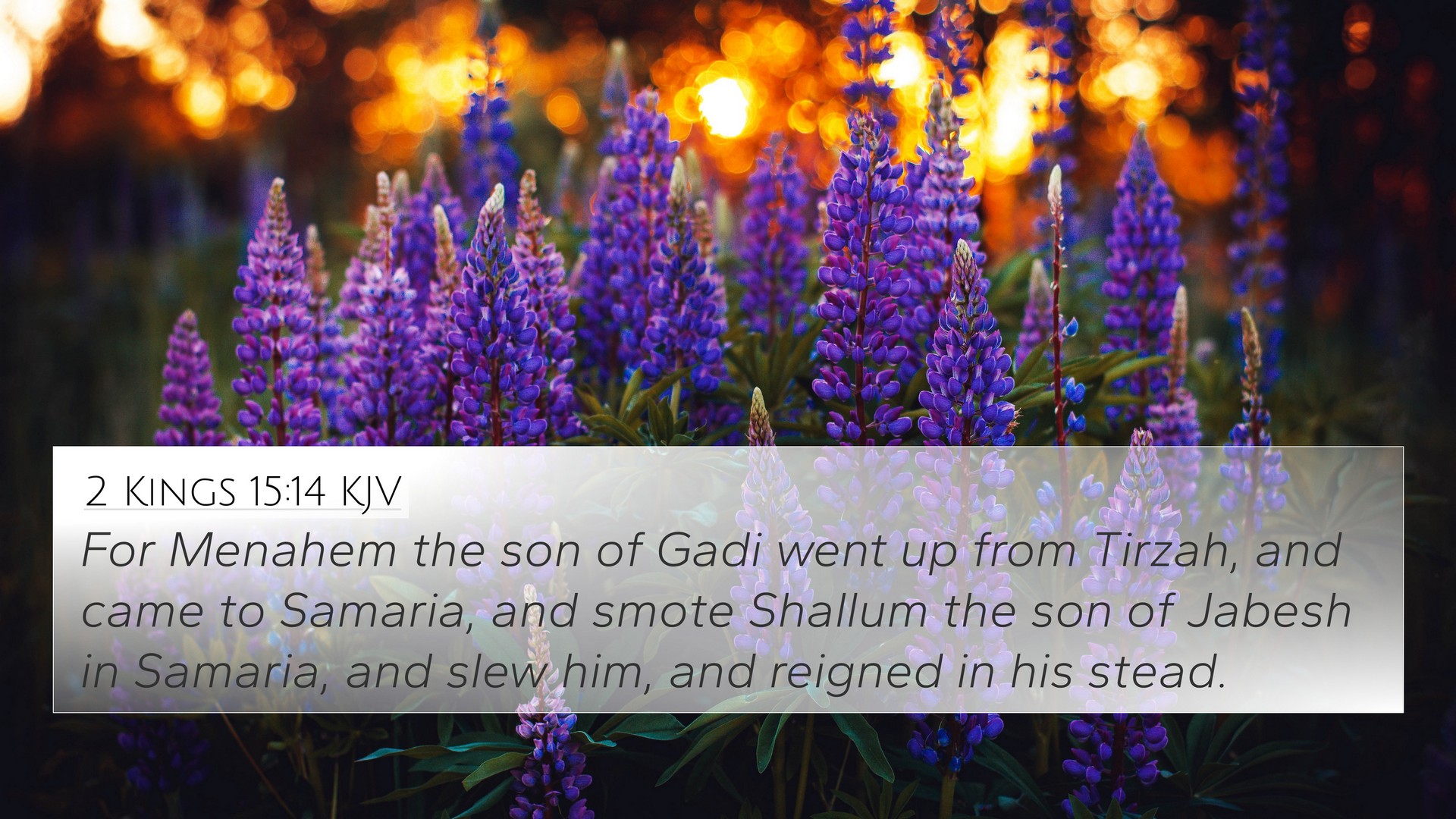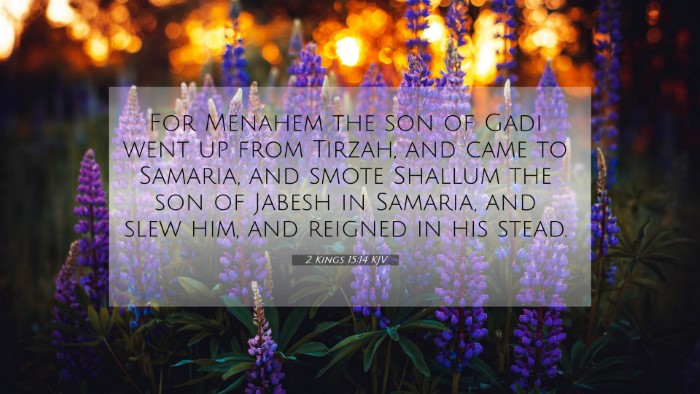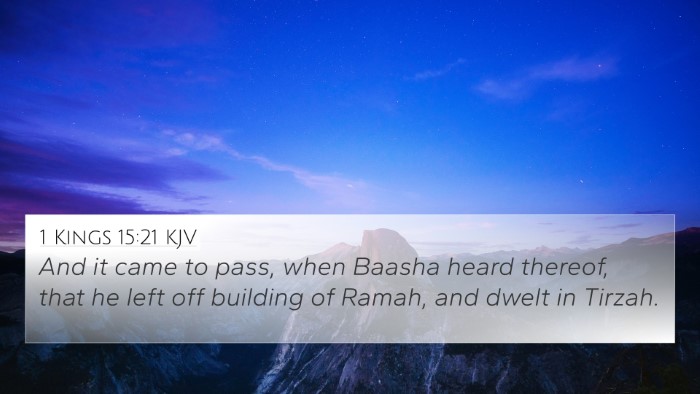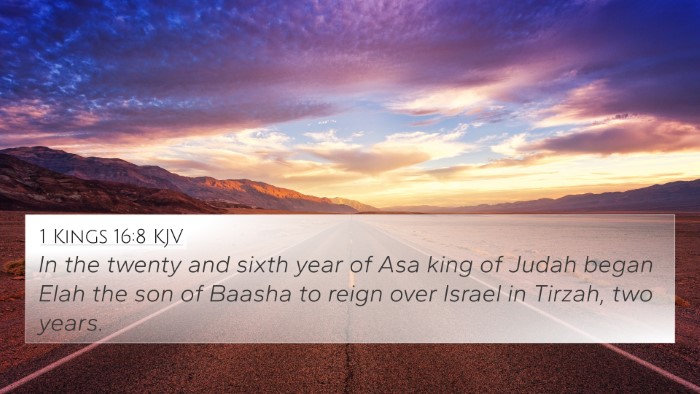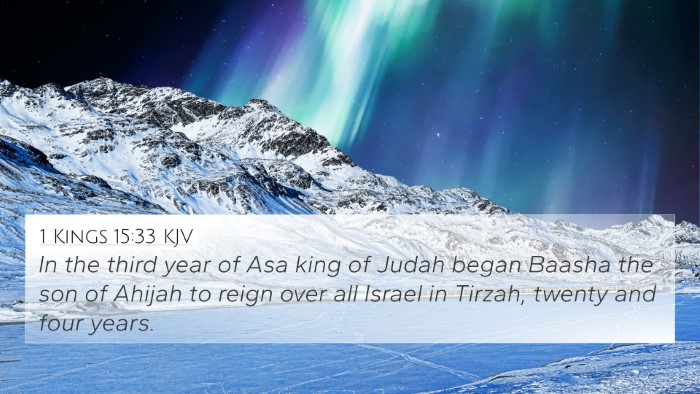Understanding 2 Kings 15:14
2 Kings 15:14 states, "For Menahem the son of Gadi went up from Tirzah, and came to Samaria, and smote Shallum the son of Jabesh in Samaria, and slew him, and reigned in his stead." This verse highlights a significant transition of power within the kingdom of Israel. Below, we will delve into the deeper meanings of this verse through insights from various public domain commentaries.
Summary of the Verse
This verse discusses the military coup led by Menahem, illustrating the political instability in Israel during this period. Menahem's rise to power marks an era characterized by violence and relentless ambition for control.
Commentary Insights
-
Matthew Henry:
Henry suggests that the actions of Menahem were not just politically motivated but also reflective of the overall moral decay in Israel. He emphasizes that Menahem's violent ascent to the throne exemplifies the consequences of turning away from God, as Israel was in a state of disobedience and idolatry.
-
Albert Barnes:
Barnes offers a historical perspective, noting that Menahem's actions stemmed from a period of severe unrest and a lack of rightful leadership. He highlights how violent usurpations were common during this era, indicating the dire need for godly leadership in Israel.
-
Adam Clarke:
Clarke points out the ramifications of such a transition, suggesting that Menahem’s rule would eventually lead to further instability. He connects this to the prophetic warnings concerning the fate of Israel should they continue in their sin.
Key Themes
This verse underscores the themes of usurpation, divine judgment, and the consequences of straying from God’s path. It calls to mind the broader narrative of the kings of Israel, many of whom faced dire consequences due to their disobedience.
Cross-References
To further understand 2 Kings 15:14, we can explore several related Bible verses that provide context and broaden the interpretation:
- 1 Kings 16:8-10: This passage discusses the murder of Elah by Zimri, similar to the violence seen in Menahem's rise.
- 2 Kings 15:10: This verse recounts the death of Shallum, setting the stage for Menahem’s coup.
- 2 Kings 14:23-24: These verses provide insight into the kingship and general moral state of Israel before Menahem.
- 2 Kings 16:1-4: Contains references to Ahaz’s reign, illustrating the continuing cycle of wicked kings in Israel.
- Hosea 13:10-11: A prophetic warning against the leaders of Israel, highlighting the consequences of poor leadership.
- Isaiah 1:23: Speaks on the corrupted leaders of Israel, relevant in understanding the context of Menahem's rule.
- 2 Chronicles 28:22-23: Discusses the alliance made with pagan nations, confirming the sinful direction of Israel’s leaders.
Thematic Connections
The event portrayed in 2 Kings 15:14 serves as a prompt for thematic exploration within the scriptures. Connecting this event with the overall narrative of the Israelite monarchy can yield deeper insights into God’s overarching plan for redemption:
- Cycle of Sin and Judgment: The kings of Israel often turned away from God, leading to cycles of judgment seen throughout the Old Testament.
- Leadership and Responsibility: The moral and spiritual responsibility of leaders is a recurring theme, stressing that poor leadership invites disaster.
- Prophetic Warnings: The warnings given by prophets to Israel serve as a reminder of the consequences of forsaking God's commands.
- God's Sovereignty: Despite the chaos, God remains sovereign over the affairs of nations, which can be seen through the rise and fall of kings.
Conclusion
In summary, 2 Kings 15:14 offers a profound look into the turbulent history of Israel, illustrating the grave consequences of turning away from God's path. Understanding this verse through the lens of cross-referenced scriptures enhances our comprehension of biblical themes relating to power, sin, and divine sovereignty.
Tools for Bible Cross-Referencing
Utilizing tools such as a Bible concordance or cross-reference Bible study can greatly aid in exploring the connections between verses. Such resources allow for comprehensive comparisons and depth of study into related themes.
